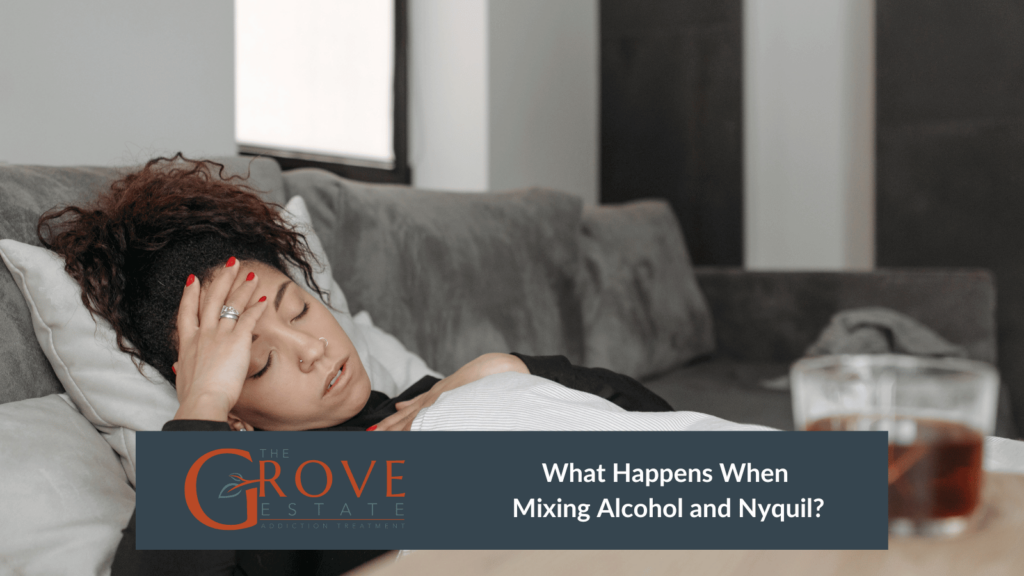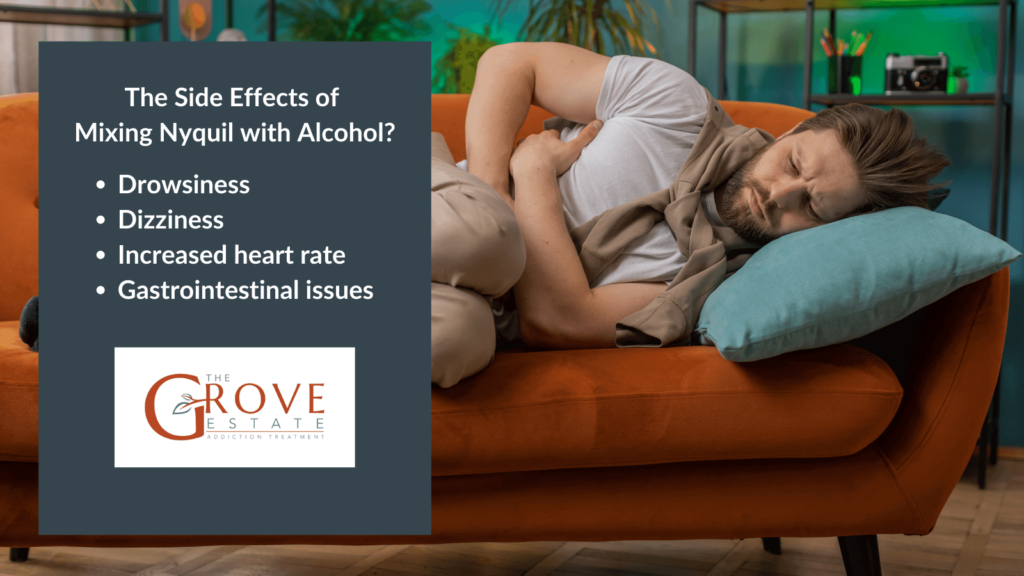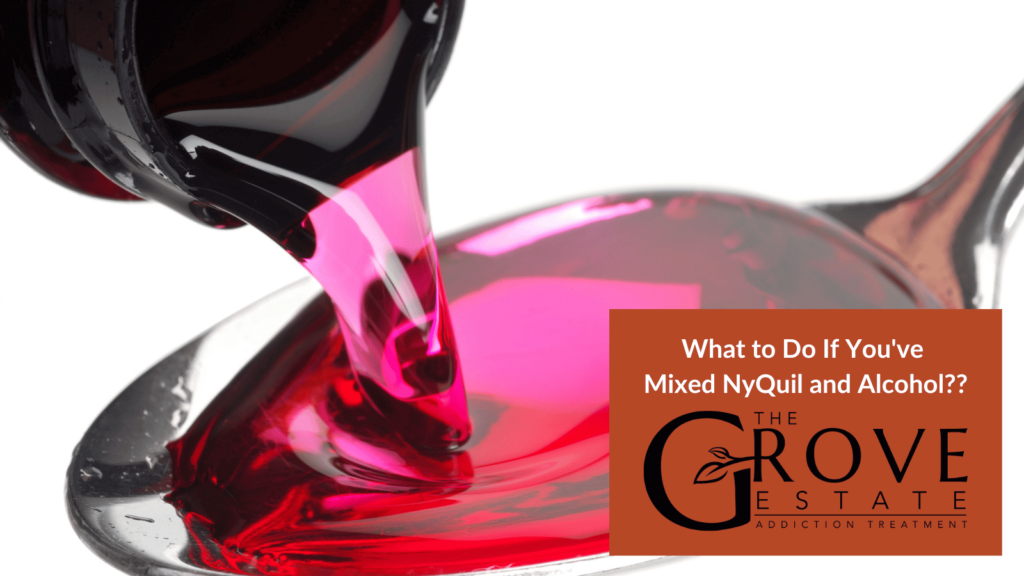The practice of mixing over-the-counter (OTC) medications with alcohol is alarmingly common, posing significant health risks that are often underestimated by the general public. Among these, the combination of NyQuil, a widely used OTC cold and flu remedy, and alcohol stands out for its potential to cause serious adverse effects. NyQuil contains acetaminophen, dextromethorphan, and doxylamine, ingredients which, when combined with the depressant effects of alcohol, can lead to severe drowsiness, impaired cognitive function, and liver damage.
According to Centers for Disease Control and Prevention (CDC): it’s estimated that over 50% of the cases of acute liver failure in the United States are linked to acetaminophen overdose, a substantial portion of which involves combinations with alcohol. A study published in the “Journal of the American Pharmacists Association” found that a significant portion of the population may not be aware of the risks associated with combining alcohol with medications like NyQuil. This lack of awareness contributes to the prevalence of this risky behavior, underscoring the need for increased public education on the subject.

What Happens When Mixing Alcohol and Nyquil?
Combining NyQuil with alcohol might seem like a shortcut to better sleep during a bout of illness. However, this pairing can be deceptively dangerous. NyQuil contains ingredients which can have their effects dramatically increased by alcohol, leading to an enhanced risk of severe drowsiness, impaired cognitive function, and significant liver damage.
One of the critical dangers of mixing alcohol with NyQuil is the potential for liver damage. NyQuil contains acetaminophen (paracetamol), a pain reliever and fever reducer known to cause liver damage in high doses or when combined with alcohol. The liver metabolizes both alcohol and acetaminophen, and combining them increases the liver’s workload, potentially leading to toxic build-up and liver injury. According to the National Institute on Alcohol Abuse and Alcoholism, mixing alcohol with medications that contain acetaminophen can lead to acute liver failure, a serious condition that can develop rapidly and is often fatal.
The sedative effects of both alcohol and the active ingredients in NyQuil can impair cognitive function and motor skills, increasing the risk of accidents and injuries. The sedation can be so profound that it suppresses the body’s natural reflexes, such as the gag reflex, raising the risk of choking or aspiration on vomit during sleep—a situation that can have deadly consequences.
What is NyQuil and its Ingredients?
NyQuil is an over-the-counter medication used for cold, flu, and allergy symptoms. Its ingredients typically include acetaminophen for pain and fever, dextromethorphan as a cough suppressant, doxylamine to alleviate runny nose and sneezing, and phenylephrine for nasal congestion. It may also contain alcohol, artificial flavors, colors, and sweeteners.
Is There Alcohol in Nyquil?
While some Nyquil products contain alcohol, others are alcohol-free. The liquid form contains about 10% alcohol, not unlike the content in wine, while the LiquiCaps are without it. This is a crucial distinction for consumers, as the presence of alcohol in medication can influence its interactions with other substances like alcoholic beverages.
The Intended Use of Nyquil
NyQuil, a household name for cold and flu relief, is helpful for those suffering from coughs, fevers, congestion, and sore throats. Designed to ease these symptoms, Nyquil is safe for adults and children over six, with specific dosages laid out to maximize its benefits and minimize risks. It’s when these guidelines are followed, and the medication is taken as intended, that NyQuil can provide a good night’s rest and a respite from the discomforts of minor illnesses.
What are the Risks of Mixing NyQuil with Alcohol?
Mixing NyQuil with alcohol poses serious health risks. This combination can lead to liver damage, overdose, and worsened side effects like dizziness, drowsiness, and increased heart rate. The consequences extend beyond the central nervous system, making it a dangerous health gamble.
Amplified Sedative Effects
The sedation that follows the mixing of alcohol and Nyquil is not just a deepening of sleep but a dangerous plunge into excessive drowsiness and impaired judgment. These central nervous system depressants, when taken together, can lead to difficulty concentrating and severe dizziness. This state not only increases the risk of accidents and injuries, but it also hinders activities requiring mental alertness, such as driving.
A Double Blow to Liver Health
When it comes to liver health, the combination of alcohol and the acetaminophen in Nyquil delivers a double hit. This duo can lead to liver toxicity and severe conditions like fatty liver disease or cirrhosis. The danger is particularly amplified for those with existing liver conditions or regular alcohol consumption, serving as a clear warning against such a mix.

What are The Side Effects of Mixing Nyquil with Alcohol- Short and Long-Term?
The immediate aftermath of mixing Nyquil and alcohol can be alarming. Side effects such as:
- drowsiness
- dizziness
- increased heart rate
- gastrointestinal issues
can occur. This combination can escalate quickly from discomfort to danger, requiring careful observation. If symptoms worsen, seek medical attention immediately.
In some cases, severe symptoms like hallucinations, seizures, and respiratory depression may surface, signaling the need for immediate medical attention. These are not symptoms to be taken lightly, as they could indicate a serious reaction to the combination of Nyquil and alcohol, potentially related to alcohol use disorder.
Long-Term Repercussions: Beyond the Hangover
The long-term implications of regularly mixing Nyquil and alcohol go beyond a simple hangover. They can range from liver complications to worsened respiratory issues, particularly for those with pre-existing health conditions. Considering the potential for serious health consequences, it’s a risk that isn’t worth taking.
Central nervous system depression, caused by a central nervous system depressant, is also a serious consequence of mixing alcohol with Nyquil, leading to slowed brain activity, confusion, and difficulty concentrating. The risk extends to respiratory depression, where breathing can become shallow, or in severe cases, lead to respiratory failure. Understanding and vigilance are required to avoid the long-term damage this complex issue can cause.
Can I Use NyQuil for Alcohol Withdrawal: Is It Advisable?
Using NyQuil for alcohol withdrawal is unsafe and misinformed. NyQuil contains small amounts of alcohol and sedatives, which can maintain dependency rather than alleviate it. This approach risks creating a new dependence on NyQuil, which is counterproductive to recovery efforts.
Safe, evidence-based alternatives for managing alcohol withdrawal involve medical supervision and may include prescription medications like benzodiazepines to manage symptoms and prevent complications. Health professionals also recommend supportive care, such as counseling and group therapy, to address the psychological aspects of addiction.
It’s critical to approach alcohol withdrawal under the guidance of healthcare professionals to ensure a safe and effective recovery process, avoiding the potential for new dependencies.
Who Should Be Extra Cautious?
Certain individuals, such as those with liver conditions or on specific medications, are at increased risk when drinking alcohol and mixing it with Nyquil. These high-risk groups must exercise extra caution or avoid consuming alcohol altogether to prevent serious health consequences.
Personal health factors such as existing medical conditions and current medications must be considered before mixing alcohol and Nyquil. Here’s a list of specific health conditions that may significantly increase the risk when mixing alcohol with medications like NyQuil or other substances:
- Liver Disease: Conditions such as hepatitis, fatty liver disease, and cirrhosis can be exacerbated by alcohol, which is metabolized by the liver.
- Chronic Kidney Disease: Alcohol can affect kidney function, worsening existing kidney problems.
- Cardiovascular Diseases:C Including hypertension (high blood pressure), heart failure, and arrhythmias (irregular heartbeat).
- Pancreatitis: Both acute and chronic pancreatitis can be aggravated by alcohol consumption.
- Diabetes: Alcohol can interfere with blood sugar levels and the effectiveness of diabetes medications.
- Epilepsy: Alcohol use can increase the frequency of seizures for those with epilepsy.
- Mental Health Disorders: Conditions such as depression, anxiety, and bipolar disorder can be worsened by alcohol use, especially when mixed with medications like NyQuil that also have central nervous system effects.
- Gastrointestinal Disorders: Such as gastroesophageal reflux disease (GERD) and ulcers, which can be irritated by alcohol consumption.
- Respiratory Diseases: Chronic obstructive pulmonary disease (COPD) and asthma can be negatively impacted by alcohol.
- Blood Disorders: Such as anemia, where alcohol use can further impair blood cell production.
While reaching for NyQuil with a drink might promise ease and rest, the reality is a concoction that delivers a host of dangerous complications, from acute liver failure to an increased risk of accidents and potentially fatal respiratory depression. These risks underscore the importance of considering the interactions between over-the-counter medications and alcohol, advocating for caution and the need to seek safer alternatives for symptom relief.
Addressing Misconceptions: NyQuil and Alcohol Addiction
Addressing common misconceptions about combining NyQuil and alcohol can help prevent misuse and potential addiction. Here are a few critical points to understand:
- Misconception: “It’s safe because they’re both legal.”
Reality: Just because both NyQuil and alcohol are legal does not mean they are safe to use together. Their combination can lead to dangerous interactions, including increased risk of liver damage and central nervous system depression. - Misconception: “Using NyQuil with alcohol will help me sleep better.”
Reality: While it might seem that mixing NyQuil with alcohol could enhance sleep due to their sedative effects, this combination actually disrupts sleep architecture and can worsen sleep quality. It also increases the risk of respiratory depression during sleep. - Misconception: “Mixing NyQuil and alcohol isn’t addictive.”
Reality: Combining NyQuil and alcohol can lead to a dependency on the mixture for sleep or relaxation, creating a cycle of addiction. The sedative effects can be habit-forming, especially when used as a coping mechanism for stress or sleep problems. - Misconception: “If I don’t do it often, it’s not harmful.”
Reality: Even occasional use of NyQuil with alcohol can be harmful due to the acute effects on the liver and potential for dangerous respiratory depression. The risk of adverse effects does not diminish with infrequent use.

What to Do If You’ve Mixed NyQuil and Alcohol?
If you or someone you know has mixed NyQuil and alcohol, the first step is to stop consuming both substances. Monitor for severe symptoms like excessive drowsiness, difficulty breathing, or confusion. Ensure the person stays hydrated and is in a safe environment to rest.
When to Consult a Healthcare Professional
It’s essential to consult a healthcare professional if you experience severe symptoms or if there’s a concern about overdose. Additionally, seek medical advice if you’re struggling to stop using these substances together, as this could indicate a deeper issue with substance use. Healthcare providers can offer guidance, support, and resources for recovery.
Can you drink alcohol while taking DayQuil?
It’s not recommended to drink alcohol while taking DayQuil as both can depress the central nervous system, leading to increased drowsiness and potential liver damage.
How long should I wait to take cold medicine after drinking alcohol?
It’s advisable to wait at least 24 hours after drinking alcohol before taking any cold medicine to avoid potential interactions and liver strain.
How much alcohol is in 30 mL of NyQuil?
A 30 mL dose of NyQuil Liquid contains about 10% alcohol, equating to approximately 3 mL of alcohol per dose.
How long does NyQuil drowsiness last?
NyQuil drowsiness can last for up to 6-8 hours, varying by individual metabolism and sensitivity to its sedative components.
Can I take NyQuil 2 hours after drinking?
It’s generally not safe to take NyQuil 2 hours after drinking alcohol due to the risk of increased drowsiness, liver stress, and potential for adverse reactions.
How does the combination of NyQuil and alcohol impact sleep quality?
While NyQuil is intended to aid sleep during illness and alcohol may initially seem to help people fall asleep faster, combining the two can significantly disrupt sleep architecture. This interaction can reduce the quality of rest, leading to fragmented sleep patterns and preventing the deep, restorative sleep stages that are essential for recovery from illness.
For those experiencing sleep disturbances, whether related to substance use or other factors, individual counseling can be a beneficial resource. Counseling provides a space to explore underlying issues contributing to sleep problems and develop healthier sleep habits and routines.
Are there specific risks for individuals with existing health conditions when mixing NyQuil and alcohol?
Individuals with pre-existing health conditions, particularly liver disorders, are at a heightened risk when mixing NyQuil and alcohol due to the compounded strain on the liver from processing both substances. Additionally, those with mental health conditions may find their symptoms exacerbated by the depressive effects of alcohol and the active ingredients in NyQuil.
For anyone with health conditions or concerns about substance use, seeking professional advice is crucial. Exploring treatment options, such as programs that address alcohol and heroin interactions, can offer guidance on managing health risks and finding safer alternatives for symptom relief and recovery support.

Share This Post



